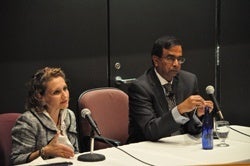October 17, 2011 — The United Nations, the World Health Organization (WHO), and a small group of disease-specific non-governmental organizations (NGOs) need help to address the mounting toll of noncommunicable diseases (NCDs)—such as cancer, cardiovascular disease, diabetes, stroke, and chronic respiratory disease—that already annually claim an estimated 36 million lives around the globe, [[Srinath Reddy]] told an overflow audience at the Harvard School of Public Health (HSPH) Sept. 27, 2011, in Kresge Auditorium G2. He said a “grand coalition” of governments, public-private partnerships, academia, and others is needed to address NCDs, which are predicted to rise significantly in the coming years.
Reddy, the first Bernard Lown Visiting Professor in Cardiovascular Health in the Department of Epidemiology at HSPH, is president of the Public Health Foundation of India. In his talk, “Global Action On Non-Communicable Diseases: The UN Summit And Beyond,” he presented his thoughts on the outcome of the historic United Nation’s High Level Meeting on Prevention and Control of Non-communicable Diseases, held Sept. 19 and 20 in New York City. Reddy. who participated in the UN gathering, spoke at HSPH as part of the Dean’s Distinguished Lecture Series.
“He is one of the most elegant speakers I’ve had the privilege of presenting to you,” Dean Julio Frenk, T&G Angelopoulos Professor of Public Health and International Development, said in introducing Reddy, a cardiologist, epidemiologist, and thought leader in global public health.
Watch a webcast of the lecture.
NCDs on the rise
NCDs annually claim more than 60% of the 57 million deaths worldwide, according to WHO. The World Bank predicts most areas of the world will see NCD-related deaths rise substantially from 2008 to 2030, particularly in Sub-Saharan Africa. A recent report co-authored by HSPH’s David Bloom estimated the cumulative loss of output to the economy due to NCDs from 2011 to 2030 to be $47 trillion. “In a world that has been buffeted by adverse economic winds, this kind of loss is totally unaffordable,” Reddy said.
In 2000 when the UN’s Millennium Development Goals were framed, Reddy said the UN was “apathetic” about NCDs. With the recent UN summit, NCDs finally are getting attention, he said, “but the biggest question is, will action follow?” The political declaration that the meeting produced lacks funding, timetables and other specifics that would encourage follow through, said Reddy.
“The poor become the most vulnerable victims of the epidemic. The poor smoke more. They eat the worst food. They are becoming increasingly physically inactive,” Reddy said. What’s more, many are pushed into poverty due to lost productivity and ailments triggered by infections, disabilities, obesity, and other preventable conditions.
Time for government action
While the UN and WHO have many global issues to deal with and may be slow to act, governments can begin now to put into action cost effective, feasible, and proven strategies endorsed by the UN, Reddy said. These include strategies like taxing tobacco, implementing tobacco control policies, curbing alcohol consumption, reducing salt, sugar, and trans fats in foods and beverages, boosting physical activity, and curbing television marketing of unhealthy food to children.
Felicia Marie Knaul, director of the Harvard Global Equity Initiative and associate professor of global health and social medicine at Harvard Medical School, led the discussion following the lecture. The risk of labeling diseases as communicable and noncommunicable is that it can create a barrier, when, in fact, there is much overlap, Knaul said. For instance, significant strides have been made in saving lives of women giving birth in developing countries, but many lives of these women are lost to cervical cancer, often associated with treatable infections.
“This idea of building bridges between the supposedly communicable and noncommunicable communities gives us a way to move forward,” Knaul said. Efforts also must not neglect the needs of children, she said, adding that children’s diseases and rights received little attention at the UN Summit.
“HSPH, in particular, has a tremendously important role to play in making sure that these frameworks, targets, indicators, and monitoring and surveillance systems are put forward and developed,” Knaul said.
–Marge Dwyer
photo: Aubrey LaMedica
